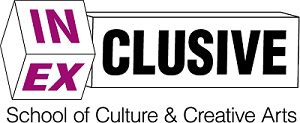
As part of our Inclusive/Exclusive season, we invited Daniel Rautenbach – artist, curator and graphic designer based in Cape Town – to share some reflections on the creative relationship between analogue and digital culture. His response is informed by ‘From the Analogue to Digital & Back’, a presentation given by History of Art’s Dr Alexandra Ross and South African artist Katherine Bull at the University of Glasgow in October 2018.
The personal brand has become such a pillar of Late Capitalism that just when we were getting sick of the ‘influencer’ model for advertising, more and more ‘virtual influencers’ have crept onto our feeds. Instagram ‘clients’ such as Lil Miquela, created by brud.fyi, are a case in point. Some of these 3D rendered ‘avatars’ function as an amalgamation of all things cool. From fashion styles to facial structure, all of these are instantaneously modular to stay updated with trends. Some go so far as punting progressive politics, for a ‘real’ / ‘non-corporate’ angle, while in reality they’re just an advertisement for another digital content agency.
What’s real? What can we trust as ‘authentic’? Since managing the online world is a task too big for us, we’ve reached out to our natural successors: algorithms. We follow too many people, have too many providers yelling their sponsored content, are confronted with too much fake news and too many bots, that we’ve handed over the reins to a select few equations that present us with what the numbers deem most appropriate for us to see. Is this constructed experience necessarily ‘less authentic’ than the classic chronologically arranged newsfeed? Or coming across something ‘by chance’?
To understand the flipside of giving algorithms power over what we see, we need only look at Facebook’s effect on public discourse during the 2016 presidential election in America. Before social media, print media operated with limited space; mainstream publications were aimed at a wider base, and so readers were more likely to come across a wider range of viewpoints. Readers who gather their news on Facebook, however, are exposed only to an increasingly refined ‘echo chamber’ of their own ideas.
On the other hand: moving from hard-drive music collections to the online streaming site, Spotify, I have constantly been surprised by my computational counterpart’s understanding of my taste, and how it leads me to music I genuinely enjoy. This isn’t like the good old days of finally buying that record you’ve been waiting and saving up for. Ironically, though, there is a different, and perhaps purer, sense of authenticity in blindly being led by what is essentially ‘my taste’ — with no exterior influencing factors. Then again, my taste is itself influenced by marketing, particularly social media branding of artists.
Remember the ‘rule of thumb’ about ‘band t-shirt’s’? “Don’t wear this band’s t-shirt unless you can name X amount of their songs or albums” – implying that there is some kind of insider knowledge only ‘true fans’ have access to. But here we are, algorithmically turning the performance of ‘true fan’ on its head – being presented with and engaging with content we like, based on other similarly-structured content; listening to a song by virtue of …liking it. Isn’t this the most ‘real’ the music industry’s ever been?
As of November 2018, Twitter has allowed users to report accounts that seem bot-like as “suspicious or spam.” In contrast with Facebook’s mysterious algorithms, this gives users another level of control over the content they see. But to what extent is this simply another way to get rid of unappealing, but no less ‘real’ voices? Perhaps the dichotomy between ‘real’ and ‘digital’ as ‘authentic’ and ‘inauthentic’ is one that should be left in the 20th century.
About the Author
danielrautenba.ch
Daniel Rautenbach is an independent curator, self-taught graphic designer, and artist. He was born in Johannesburg, South Africa and is based in Cape Town. His work and research concern cultural power dynamics, artist-curator collaboration, branding, technology, and the internet. With a broad background beyond art he seeks to articulate ways in which culture operates across all facets of society. He has participated in residencies and workshops both nationally and internationally, and has worked for multiple institutions throughout the art world. Through these experiences he is slowly deciphering the matrix of our cultural economy. He currently works at Norval Foundation doing graphic design, exhibition production & other curatorial work. He also likes dogs and questioning what it means to be Afrikaans.
‘From the Analogue to Digital & Back’ was one of six short talks given by School of Culture & Creative Arts staff exploring the concept of ‘Borders’ from a variety of cultural angles. All six talks are available here, alongside Dr Manlio Graziano’s (Université Paris-Sorbonne) guest lecture which launched the ‘Inclusive/Exclusive’ season: ‘New National & International Borders in a Global Era’.


